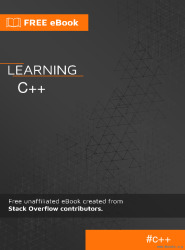Learning C++
Table of contents
- Getting started with C++
- Alignment
- Argument Dependent Name Lookup
- Arithmitic Metaprogramming
- Arrays
- Atomic Types
- Attributes
- auto
- Basic input/output in c++
- Basic Type Keywords
- Bit fields
- Bit Manipulation
- Bit Operators
- Build Systems
- C incompatibilities
- C++ Containers
- C++ Debugging and Debug-prevention Tools & Techniques
- C++ function "call by value" vs. "call by reference"
- C++ Streams
- C++11 Memory Model
- Callable Objects
- Classes/Structures
- Client server examples
- Common compile/linker errors (GCC)
- Compiling and Building
- Concurrency With OpenMP
- Const Correctness
- const keyword
- Constant class member functions
- constexpr
- Copy Elision
- Copying vs Assignment
- Curiously Recurring Template Pattern (CRTP)
- Data Structures in C++
- Date and time using header
- decltype
- Design pattern implementation in C++
- Digit separators
- Enumeration
- Exceptions
- Explicit type conversions
- Expression templates
- File I/O
- Floating Point Arithmetic
- Flow Control
- Fold Expressions
- Friend keyword
- Function Overloading
- Function Template Overloading
- Futures and Promises
- Header Files
- Implementation-defined behavior
- Inline functions
- Inline variables
- Internationalization in C++
- Iteration
- Iterators
- Keywords
- Lambdas
- Layout of object types
- Linkage specifications
- Literals
- Loops
- Memory management
- Metaprogramming
- More undefined behaviors in C++
- Move Semantics
- mutable keyword
- Mutexes
- Namespaces
- Non-Static Member Functions
- One Definition Rule (ODR)
- Operator Overloading
- operator precedence
- Optimization
- Optimization in C++
- Overload resolution
- Parameter packs
- Perfect Forwarding
- Pimpl Idiom
- Pointers
- Pointers to members
- Polymorphism
- Preprocessor
- Profiling
- RAII: Resource Acquisition Is Initialization
- Random number generation
- Recursion in C++
- Recursive Mutex
- Refactoring Techniques
- References
- Regular expressions
- Resource Management
- Return Type Covariance
- Returning several values from a function
- RTTI: Run-Time Type Information
- Scopes
- Semaphore
- SFINAE (Substitution Failure Is Not An Error)
- Side by Side Comparisons of classic C++ examples solved via C++ vs C++11 vs C++14 vs C++17
- Singleton Design Pattern
- Smart Pointers
- Sorting
- Special Member Functions
- Standard Library Algorithms
- static_assert
- std::any
- std::array
- std::atomics
- std::forward_list
- std::function: To wrap any element that is callable
- std::integer_sequence
- std::iomanip
- std::map
- std::optional
- std::pair
- std::set and std::multiset
- std::string
- std::variant
- std::vector
- Storage class specifiers
- Stream manipulators
- Templates
- The ISO C++ Standard
- The Rule of Three, Five, And Zero
- The This Pointer
- Thread synchronization structures
- Threading
- Trailing return type
- type deduction
- Type Erasure
- Type Inference
- Type Keywords
- Type Traits
- Typedef and type aliases
- Undefined Behavior
- Unions
- Unit Testing in C++
- Unnamed types
- Unspecified behavior
- User-Defined Literals
- Using declaration
- Using std::unordered_map
- Value and Reference Semantics
- Value Categories
- Variable Declaration Keywords
- Virtual Member Functions
| Pages : | 897 |
| Size : | 5.3 MB |
| File type : | |
| Downloads: | 237 |
| Created: | 2022-02-03 |
| License: | CC BY-SA |
| Author(s): | Stack Overflow Community |

Warning: Trying to access array offset on false in /home/tutovnfz/public_html/article.php on line 233
Others c++ Tutorials
Others related eBooks about Learning C++
Introduction to Microsoft Word 2010Download free training document in PDF intituled Introduction to Microsoft Word 2010, course on 159 pages for beginners....
Csharp Programming TutorialDownload this C# PDF Tutorial for free, it's consisting of 5 chapters covering all the most important C# concepts. This tutorial is intended for beginner programmers, and we recommend you to go through all the chapters, to get the most out of it as possible....
Neural Network Programming with JavaVast quantities of data are produced every second. In this context, neural networks become..., download free Java tutorial in PDF (244 pages) created by Alan M.F. Souza ....
Neural Networks with JavaScript SuccinctlyDownload free course Neural Networks with JavaScript Succinctly, pdf file on 163 pages by James McCaffrey....
Reverse Engineering for BeginnersDownload free ebook about Reverse Engineering for Beginners. A PDF tutorial on 942 pages by Dennis Yurichev....
The Rook's Guide to C++This Creative Commons-licensed textbook written by Norwich University students and faculty aims to provide an introduction to the C++ programming language. The PDF and original typesetting materials are available if you are interested in having a free digital copy of your own or if you wish to contr...
Think JavaDownload free course Think Java, pdf file on 374 pages by Allen Downey, Chris Mayfield....
How To Make Video GamesLearn How To Make Video Games, This ebook shows you everything you need to know to make video games....
Modeling and Simulation in PythonThis book is an introduction to physical modeling using a computational approach. It is organized in three parts:...
Java Programming for KidsThe goal of this book is to help students learn to program in the most popular language in the world: Java. It starts from an introduction to Java and then explains how to write programs that have Graphic User Interface by writing the Tic-Tac-Toe and Ping-Pong games....